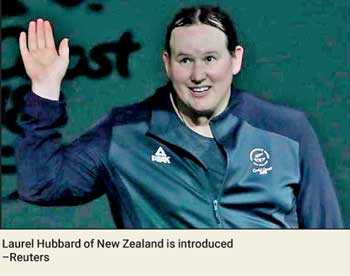Tuesday Feb 24, 2026
Tuesday Feb 24, 2026
Saturday, 8 May 2021 00:00 - - {{hitsCtrl.values.hits}}
 Wellington, (AFP): New Zealand weightlifter Laurel Hubbard is poised to become the first transgender athlete to compete at the Olympic Games, in a move that will reignite the often vitriolic debate over the ethics of trans sport.
Wellington, (AFP): New Zealand weightlifter Laurel Hubbard is poised to become the first transgender athlete to compete at the Olympic Games, in a move that will reignite the often vitriolic debate over the ethics of trans sport.
The 43-year-old, who was born male but transitioned to female in her 30s, is on the verge of reaching the Tokyo Olympics under coronavirus-enforced new qualifying rules.
Hubbard, who also competed as a male, became eligible to lift as a woman after showing testosterone levels below the threshold required by the International Olympic Committee.
She is aiming to make New Zealand’s Tokyo Olympics squad to contest the women’s +87kg category, an event in which she is currently ranked 16th in the world.
Hubbard is already in the history books after becoming the first transgender Commonwealth Games athlete at the Gold Coast in 2018, when she had to withdraw after suffering an elbow injury that almost ended her career.
While the New Zealand team is yet to be named, officials said Hubbard was likely to meet new qualification criteria that have been simplified by the International Weightlifting Federation because of the COVID-19 pandemic.
“The NZOC can confirm that revised international federation (IF) qualification systems are very likely to see a number of New Zealand weightlifters, including Commonwealth Games transgender athlete Laurel Hubbard, allocated an IF quota spot for Tokyo 2020,” the New Zealand Olympic Committee said.
The NZOC has strongly backed Hubbard’s right to compete in the past, and said all athletes selected for Tokyo would receive its support. “The New Zealand team has a strong culture of manaaki (caring), inclusion and respect for all,” it said.
‘I am who I am’
Not all in the sporting world have been so welcoming and Hubbard’s appearance at the Games is sure to generate intense interest and spotlight the thorny issue of transgender athletes.
She has become an unwitting lightning rod for discussion on the issue, with some arguing she has an unfair advantage over female-born athletes and others saying she meets the criteria laid down by the IOC.
In a vastly complex debate, both sides claim to have science on their side.
Current IOC rules state a trans woman can compete provided her testosterone levels are below 10 nanomoles per litre, a criteria Hubbard meets.
In 2018, Oceania Weightlifting Federation general secretary Paul Coffa defended Hubbard’s participation in the Commonwealth Games.
“She’s done everything according to the IOC rules and she’s proven that she’s a woman... so give her a chance and let her continue,” he said.
But the Australian Weightlifting Federation unsuccessfully tried to have her barred from the event, arguing the physique and power she developed as a male before transitioning gave her a physical advantage regardless of testosterone levels.
“In our respectful view, the current criteria and its application has the potential to devalue women’s weightlifting and discourage female-born athletes from pursuing the sport at an elite level in the future,” it said.
While there are genuine issues to be debated, discussion about transgender sport is a hot-button topic that frequently descends into acrimony and name calling, particularly online.
British television presenter Piers Morgan targeted Hubbard last year, when her Olympic berth began looking a realistic prospect after strong comeback performances following the elbow injury.
“This is insane. Women’s rights to basic fairness & equality are getting destroyed at the altar of political correctness,” Morgan tweeted.Hubbard rarely gives interviews but told Radio New Zealand in 2017 that she just wanted to compete in the sport she loves and “blocked out” criticism.
“If I try and take that weight on board it just makes the lifts harder... I am who I am,” she said.
“I don’t want to change the world. I just want to be me and do what I do. “